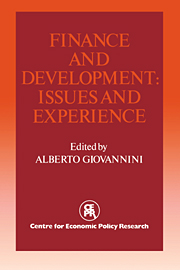Book contents
- Frontmatter
- Contents
- List of figures
- List of tables
- Preface
- List of conference participants
- 1 Introduction
- PART I THE ROLE OF FINANCE IN ECONOMIC DEVELOPMENT
- PART IIA CASE STUDIES – FINANCIAL MARKETS AND ECONOMIC DEVELOPMENT
- PART IIB CASE STUDIES – GOVERNMENT POLICIES
- 8 Macroeconomic control in liberalizing socialist economies: Asian and European parallels
- 9 Regional imbalances and government compensatory financial flows: the case of Spain
- PART III DEVELOPMENT FINANCE
- Index
8 - Macroeconomic control in liberalizing socialist economies: Asian and European parallels
Published online by Cambridge University Press: 05 November 2011
- Frontmatter
- Contents
- List of figures
- List of tables
- Preface
- List of conference participants
- 1 Introduction
- PART I THE ROLE OF FINANCE IN ECONOMIC DEVELOPMENT
- PART IIA CASE STUDIES – FINANCIAL MARKETS AND ECONOMIC DEVELOPMENT
- PART IIB CASE STUDIES – GOVERNMENT POLICIES
- 8 Macroeconomic control in liberalizing socialist economies: Asian and European parallels
- 9 Regional imbalances and government compensatory financial flows: the case of Spain
- PART III DEVELOPMENT FINANCE
- Index
Summary
This paper explains why price inflation and a general loss of macroeconomic control are almost endemic in a liberalizing socialist economy – whether in Asia or in Eastern Europe. In their rush to decentralize decision– making, privatize, and dismantle the apparatus of central planning, reformers inadvertently upset the pre– existing system for sustaining macroeconomic equilibrium. The ability of the reform government to collect taxes and control the supply of money and credit is unwittingly undermined by the liberalization itself. Thus, the first part of the paper seeks to understand how the preexisting system of financial control under Stalinist central planning actually worked, and why it tends to break down once liberalization begins.
The Stalinist system of financial control was remarkably similar across all the socialist economies – whether in, say, the Soviet Union before 1985 or in China before 1979. In Eastern Europe, however, the liberalization process itself is being confounded by the simultaneous breakup of whole countries – as in the former Soviet Union and Yugoslavia. Similarly, the precipitate decline of the old CMEA trading regime in 1990–91 has severely disrupted even those Eastern European economies which are managing to hold together politically.
In contrast, the Asian socialist economies – China, Vietnam, Laos, Mongolia and Myanmar – are culturally and politically more homogeneous. Their economic liberalizations are not being confounded by simultaneous attempts to redraw national political boundaries. For China, Laos, and Myanmar, the importance of CMEA trade was more marginal and its break up of little significance.
- Type
- Chapter
- Information
- Finance and DevelopmentIssues and Experience, pp. 223 - 260Publisher: Cambridge University PressPrint publication year: 1993
- 3
- Cited by



